

Untitled. CLOs are often expected to perform miracles: solve deep-seated learning deficits; design transformational learning programs for all levels; take risks so their organization’s learning processes are cutting-edge; be able to put a new program or process in place at hyper-speed; all while cutting budgets to the bone and delivering a return on investment.
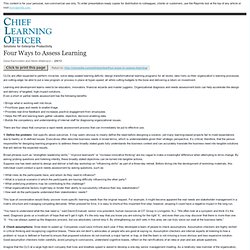
Learning and development teams need to be educators, innovators, financial wizards and master jugglers. Organizational diagnosis and needs assessment tools can help accelerate the design and delivery of targeted, high-impact solutions.Even a short or partial needs assessment has the following benefits: There are four steps that comprise a rapid needs assessment process that can immediately be put to effective use. 1. Why Do We Remember Bad Things? You remember where you were on the morning of 9/11, but you have no recollection of what you had for lunch last Thursday.
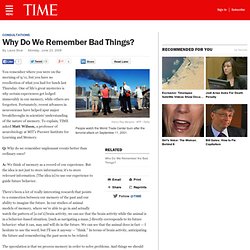
One of life's great mysteries is why certain experiences get lodged immovably in our memory, while others are forgotten. Fortunately, recent advances in neuroscience have helped spur major breakthroughs in scientists' understanding of the nature of memory. To explain, TIME asked Matt Wilson, a professor of neurobiology at MIT's Picower Institute for Learning and Memory. Why People Remember Negative Events More Than Positive Ones. Audia_and_locke_2003. Corporate Learning Trends: Where Are We Now? (White Paper) Awesome Chart on " Pedagogy Vs Andragogy " Adult learning is a vast area of educational research and probably one of the most complicated.
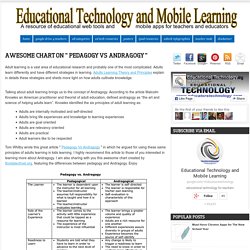
E-Learning in Education: Andragogy and constructivism. Andragogy aligns with constructivism as a theory and a method employing new techniques that engage adult students in online learning.
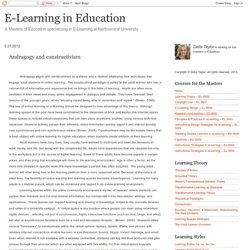
The constructivist paradigm is suited to the adult learner who has a cabinet-full of information and experience that he brings to the table of learning. Adults are often more confident in their views and enjoy active engagement in dialogue and debate. They have “learned” their lessons of the younger years, when “knowing meant being able to remember and repeat.”
(Brown, 2005). The use of online learning or e-learning should be designed to take advantage of this theory. Adult learners have busy lives; they usually have learned to multi-task and meet the demands of work, family, and life. Learning spaces within the online community encompass a myriad of “spaces” where students can pursue their interests and not only receive information, but incorporate it into discussions, writings, and applications. References Brown, M. (2005) Learning Spaces. EAC 595G The Adult Learner - WolfWikis. From WolfWikis Introduction to Andragogy Initially termed by Alexander Kapp in 1833, Andragogy has been defined by Malcolm Knowles as the art and science of helping adults learn.
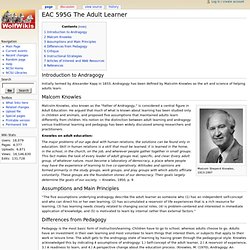
Malcom Knowles Malcom Sheperd Knowles, 1913-1997 Malcolm Knowles, also known as the "Father of Andragogy," is considered a central figure in Adult Education. Knowles on adult education: The major problems of our age deal with human relations; the solutions can be found only in education. Assumptions and Main Principles “The five assumptions underlying andragogy describe the adult learner as someone who (1) has an independent self-concept and who can direct his or her own learning, (2) has accumulated a reservoir of life experiences that is a rich resource for learning, (3) has learning needs closely related to changing social roles, (4) is problem-centered and interested in immediate application of knowledge, and (5) is motivated to learn by internal rather than external factors.”
Differences from Pedagogy Critique 1. Podagogy? Podagogy?
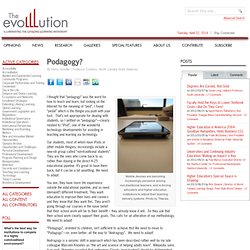
Mobile devices are becoming increasingly pervasive among non-traditional learners, and is forcing educators and higher education institutions to adjust their learning delivery systems. Photo by Titanas. I thought that “pedagogy” was the word for how to teach and learn, but looking on the Internet for the meaning of “ped”, I found “pedal” which is the thingie you push with your foot. That’s not appropriate for dealing with students, so I settled on “pedagogy”—clearly related to “iPod”, one of the wonderful technology developments for assisting in teaching and learning via technology.